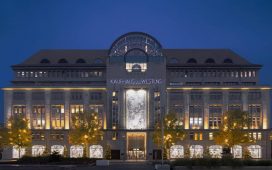Since last week, protests have been ongoing in the US following the death of African-American man, George Floyd, at the hands of a white Minneapolis police officer. Since then, many white people are asking themselves what part they play in the daily racism people of colour experience. How can they educate themselves and take positive action to ensure the future doesn’t repeat the past and the present? It’s clear that an Instagram post will never be enough. Three black writers give their perspective.
Dr Ateh Jewel

Last week, we bore witness to the George Floyd video with shock and disgust.
The streets of America are on fire in protest. Millions are engaged in peaceful protest and others have descended into violence and looting.
The powerful images I’m seeing from across the pond, as well as the thousands who are gathering in the UK protesting in solidarity and recognition of institutional racism, has made me think people are finally saying, ‘enough is enough.’
But let me tell you the reality of how it is for me being a black woman living in the UK. All my university education: a BA history degree 2:1 from a Russell Group University. An honorary doctorate from Solent University. An education at a private girls’ school in Knightsbridge. Power: my father was a diplomat for the UN and a self-made millionaire. And my platform as an award-winning journalist, blogger, director, producer. And I’m a mother of twin daughters. It all means nothing.
I’m often judged negatively based on the level of my melanin. This means I’m not given the benefit of the doubt, I have seen my white colleagues waved through security for a work event, while I have been stopped and searched, as they assume I am up to no good and not an invited guest. I have been denied access to work events based on my “fashion trainers”, which weren’t deemed part of the dress code, only to know many of my white colleagues where in the event with similar shoes or even less “appropriate” shoes. People think I’m wrong. People assume and project incorrect narratives on me, like the time 6 years ago, as an over-anxious new mum, I rushed to A&E over a sniffle and was asked ‘who my social worker was’ in a dismissive way. I was furious and said, “I don’t have a social worker, where is the doctor”. I was met with a terrified look and no answer, as they scuttled off. My power and right to be treated with respect, is often very challenging and is met with silence let alone an apology. I have dealt with micro-aggressions like this, invisible judgments and barriers for most days, all my life.
If you are one of the white people thinking that this time, it’s enough and want to invoke real change, sharing an Instagram post, and quoting Martin Luther King is NOT enough.
To be part of the cure of the sickness of racism you have to put your money, voice and body on the line. This means peacefully protesting, emailing your MP and putting pressure on them to make real changes in the law. To make it a crime to falsely report people for minor infractions, which many people of colour suffer from in everyday situations such as having a BBQ, bird watching, going to your gym, trying to enter your own building and jogging – all activities people of colour have been shot, murdered and harassed for doing around the globe.
You can also donate to the Minnesota Freedom Fund who do great work around racial injustice. Covid-19 has shown the world the normal rules that bind us don’t really exist and this is the time to take action and make the world a better and safer place for everyone. Let’s move beyond social media posting and show our support as allies in practical and meaningful ways. Let’s stand up together.
Stephanie Yeboah

@stephanieyeboah / Instagram
The murders, marginalisation, harassment, assault, dehumanisation and erasure of black people in our society isn’t just a ‘black’ problem. It isn’t an ‘American’ problem. It is a human rights issue that affects humanity across all continents. Our pain and struggle is more than just a 24 Instagram story illustration. Since the beginning of time, white people have had the privilege of turning away, or being passive to tragedies and injustices black people face because of the colour of our skin, and we cannot allow this apathy to continue, especially considering the impact and influence of black culture and how it impacts all cultures.
Now more than ever, we need to see protests happening globally, because racism is a global issue. It would be ignorant to ignore the fact that the UK, whose bloody historical trail of slavery, racism and colonisation fast became the blueprint for the United States, as well as other countries – also has its fair share of racism. Just because it may not come across as overt as other countries, it doesn’t mean it doesn’t exist. If anything, the racism in the UK is even more insidious due to how subtle and institutionally ingrained it is to everyday life. From white women touching my hair without asking, remarking on how ‘different’ and ‘wirey’ it is, to having glass bottles thrown at me in the street and openly being compared to a monkey, myself, as well as a large host of other black people in the UK are the subject of racism.
It’s great that white people in the UK are talking about the issues of race and privilege, however, we need to go beyond talking for the sake of being performative, and make this an ongoing learning process. White people need to educate and check themselves on their privilege through the use of free and paid resources online, in books, or via the media. It is important for it to be understood that the colour of their skin has afforded them a lifetime of being seen as ‘normal’ and acceptable in all forms. Having privilege doesn’t necessarily make one richer, more desirable or ‘luckier’, it simply means that because of the colour of your skin, you are not faced with the same stereotypes and prejudices that hold back black people and people of colour.
Challenge peers who still do not recognise their privilege, speak up on behalf of black people when injustices arise, without centering yourselves in the conversation and making it about your opinions and perspectives on the important issues. Instead, lift up and provide visibility to those without privilege who need to have their voices heard.
Lastly, it’s important to constantly work to help dismantle the inequalities that are faced by black people on an everyday basis in the UK. Even if this means offending your privileged peers who may not be comfortable with change. And inciting chaos by disrupting the status quo consisting of whiteness being at the forefront of every subject, opportunity, beauty standard and goal.
Nyome Nicholas-Williams

The protesting for #BlackLivesMatter this weekend in the UK is of course in solidarity for the slain black people at the hands of the police in the US; however it is a much too late wake up call for the UK to address the racism in this country. While much needed, there is a fear that the protests will go in the way that most things go viral – it has a big surge and then will fizzle out and become a distant memory. A memory that didn’t go very far, be forgotten about and will be out of the media to make way for the next viral story.
The true work goes so much deeper than a hashtag or the chanting. The learning must come from white people who call themselves allies by doing the research , seeking the vast library of education created by black scholars and leaders and not asking black people to do the work and ‘teach’ them.
#BlackLivesMatter applies here as well; unlike the US the racism here is subtle. It is in the microaggressions in nearly every workplace and school, the butterflies in your stomach when you walk past a white police officer. It’s in the lack of representation on advertisements which scream ‘none of this is for you and we don’t want your products shown’. As a model I have had comments made about the texture of my hair, like when I had a small afro, a hair stylist on set told me she’d not expected my hair to be this soft. MUAs constantly don’t have the right makeup for my skin; on every shoot I have ever worked on, there has never been a black person or POC doing my makeup.
I bring my own concealers and foundations, otherwise I end up looking too dark or too light. I’ve experienced the feeling that my presence on set is like an event; once, a stylist was staring at me continuously, when I asked why she said ‘I was looking at your skin and how beautiful it is’, adding that she ‘wished she was as dark as me’, and that her children were ‘mixed race’ as if to validate her commenting on the colour of my skin.
We need to go back to the root of the institutional racism in this country which appears to be progressive and inclusive, but the dirty glass ceiling put above black people’s heads centuries ago is being cleaned, so it’s harder to see, and harder to prove, but it is still very much there.














